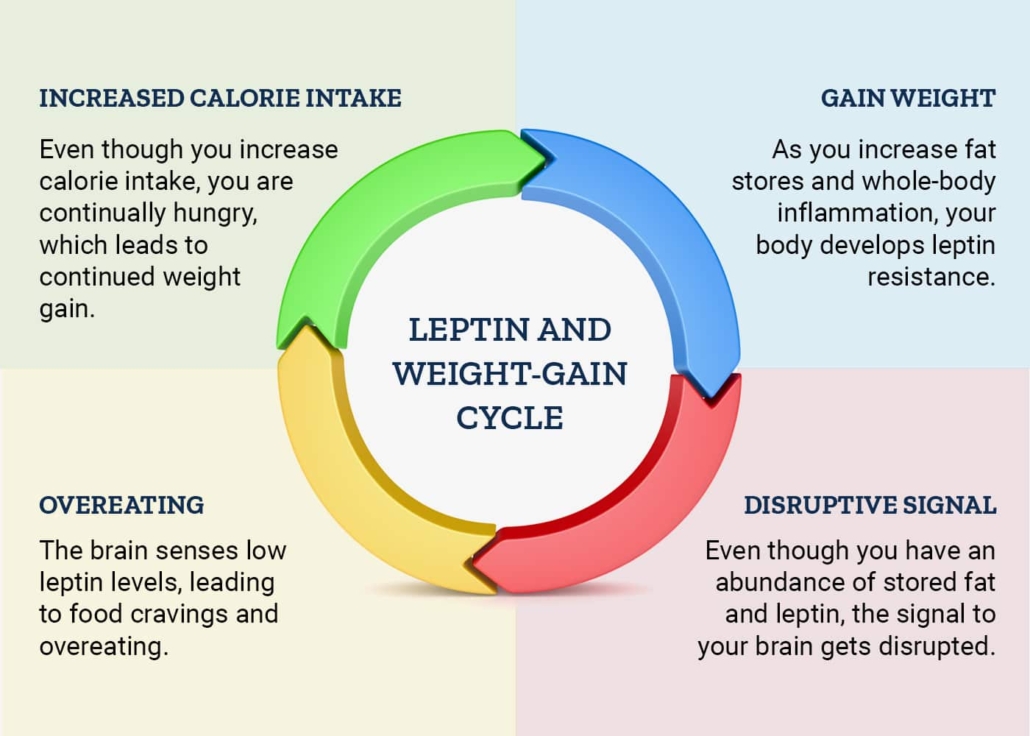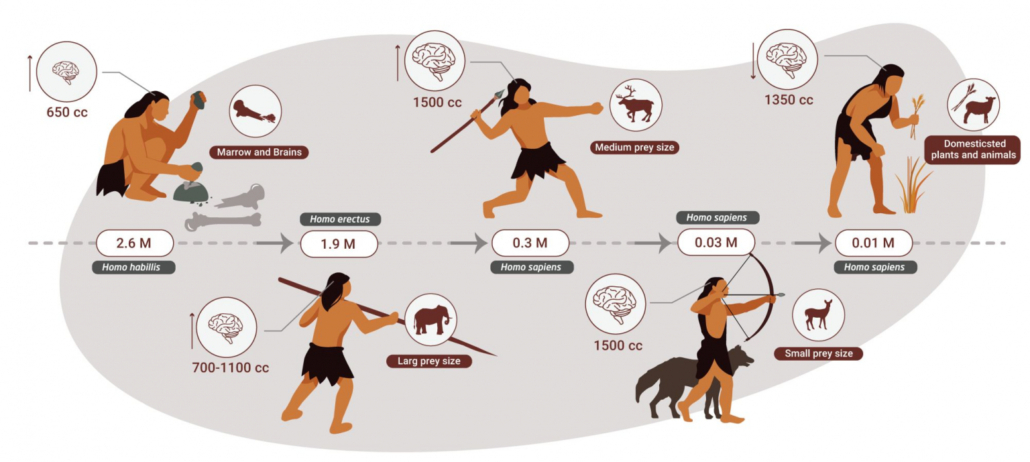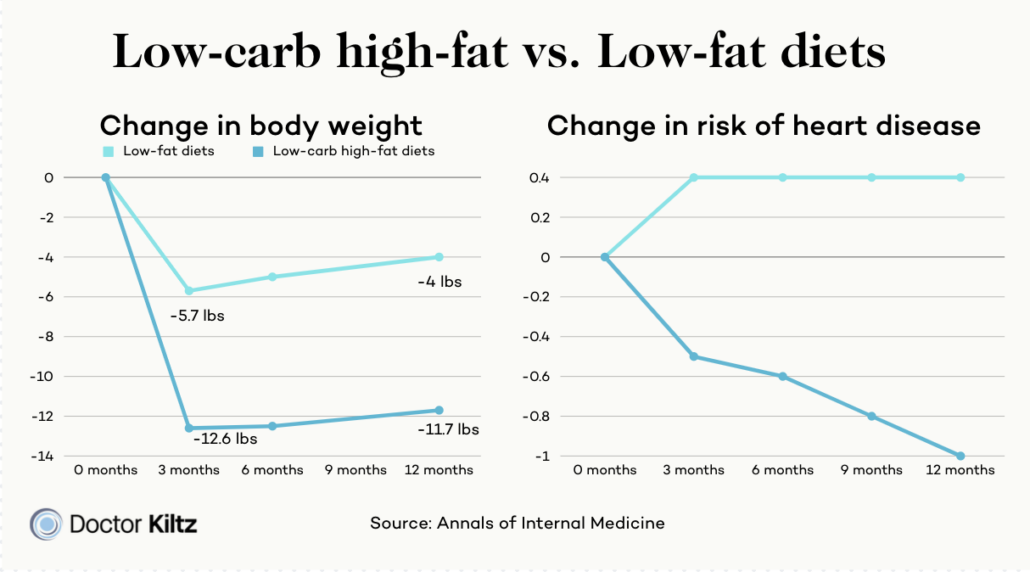We include products in articles we think are useful for our readers. If you buy products or services through links on our website, we may earn a small commission.
Will Cutting Sugar Help With Weight Loss? Yes! Here’s How

The standard American diet is loaded with sugar, and studies show that consuming lots of sugar is a leading cause of obesity.4 In 2020, 41.9% of Americans were obese, up from 30% in 2000.5 In light of these alarming trends, let’s explore how sugar makes you gain weight, and how cutting sugar can be the key to weight loss.
Table of Contents
What is Sugar?
First, let’s get clear on what we mean by sugar.
Candy, pastries, and other sweets are all obvious high-sugar foods. But many other less obvious foods are responsible for our high-carb diets, including grains, low-fat dairy, fruits, and even veggies like broccoli all contain sugar.
In short, any calorie that is not fat or protein comes from carbohydrates. And all carbs are sugars that get broken down into glucose, AKA blood sugar.
In fact, the average American consumes around three pounds of sugar each week. This total includes 17 teaspoons or 71.14 grams of added sugars per day.2 Over the course of a year, this comes out to 57 lbs of added sugars per person.
And most of the sugar you consume is hidden in low-fat and plant-based products.
All this sugar is doing more than adding excessive calories to your diet. Sugar makes you fat by disrupting hormones that regulate how your body burns and stores calories. This is why cutting sugar is a key to weight loss.
How Does Sugar Make Us Fat?
Consuming a high-carb (high-sugar) diet causes the pancreas to release the hormone insulin. Higher insulin levels trigger the body to store calories as fat.
Yet, insulin is only one hormonal factor in how sugar causes excess weight gain. The hormone called leptin is even more instrumental.
Recent research has led researchers to consider leptin resistance as the main biological factor driving obesity.

It’s no surprise, then, that the foods implicated in obesity are the same foods that drive leptin resistance. High-sugar foods like refined grains, fruit, and added sugars spike leptin levels while interfering with leptin receptors in your hypothalamus.
Grains and legumes also contain high levels of an antinutrient called lectin. Studies show that lectins interfere with leptin regulation by binding to leptin receptors in the brain.
When you’re leptin resistant, your brain can’t “hear” the messages that leptin sends to stop eating. Instead, your brain is stuck in a starvation state and releases other hormones that tell your body to
- keep eating
- crave fattening, high-carb foods
- Conserve energy by moving less
For our ancestors, leptin resistance supported survival by encouraging overeating of the rare seasonal fruits that ancient hunter gatherers came across and turning these calories into stored fat.
The modern epidemic of leptin resistance is rooted in consuming high-sugar post-agrarian foods, that did not exist for the vast majority of human evolution. These foods include
- Grains
- Added sugars
- Cultivated fruits, vegetables, and legumes
For most of human evolution dietary animal fat has been our primary fuel source, and our bodies are primed to store and then break down stored fat between successful hunts of fatty animals. We are not metabolically evolved to consume chronically high levels of carbs.

Source: Dr Miki Ben Dor
It’s no wonder then that by eliminating these high-sugar foods and replacing these calories with nutrient-dense animal products, we can reverse leptin resistance and support weight loss.
Leptin resistance leads to a self-reinforcing cycle of craving and consuming high-carb foods, storing excess fat, and lacking the motivation to move your body.
This chain reaction can contribute to diseases, including obesity, cardiovascular disease, and diabetes.
Studies on Cutting Sugar and Weight Loss
Most studies looking at cutting sugar and weight loss come from research on low-carb, high-fat diets compared to calorie-restricting and low-fat diets.
From a metabolic perspective, a high-fat, low-carb diet is the only viable way to dramatically cut carbs/sugars.
This is because our bodies can only get around 35% of our calories from protein before succumbing to protein poisoning.
The rest of our calories have to come from carbs or dietary fat. This “protein constraint” is another signpost pointing to how humans evolved on a diet of mostly fatty meat.
So what happens when modern humans eliminate sugar and eat an ancestrally aligned diet of mostly meat?
Carnivore Approach to Cutting Sugar for Weight Loss
Though studies on the all-meat carnivore diet are still emerging, a 2021 report out of Harvard University found that “Contrary to common expectations, adults consuming a carnivore diet experienced few adverse effects and instead reported health benefits and high satisfaction.”
Regarding weight loss, 93% of the 2,019 participants reported that they improved or resolved obesity and excess weight.
You can see these dramatic results reflected in numerous carnivore diet before and after pics.
Keto Approach to Cutting Sugar for Weight Loss
High-quality randomized control trials comparing very low-carb ketogenic diets with low-fat, calorie-restricting diets have found that keto results in dramatically better health outcomes regarding weight loss and cardiovascular health.

A 6-month trial compared a very-low-carbohydrate diet (VLCD) to a calorie-restricted low-fat (CRLF) diet to promote weight loss in healthy, obese women.
The VLCD group lost twice as much weight as the CRLF group. Remarkably, both groups ate the same number of calories (1650) per day. This outcome suggests that sugar/carbs are a key factor in weight gain and in inhibiting weight loss.
A study published in the New England Journal of Medicine compared three diets for weight loss: the Mediterranean diet, a low-fat diet, and a low-carbohydrate diet. The study followed participants for 2-years–an extraordinarily long time for diet studies.
Again, the low-carb diet group lost the most weight, even though they were permitted to increase their intake from 20 grams per day at the start of the study to 120 grams at the end of the study.
A study with 79 obese adults found that cutting carbs/sugar intake to less than 30 grams per day resulted in an average loss of 8.8 pounds more than participants who restricted fat to less than 30% of daily calories over 6 months.
The results of these and numerous other studies clearly show that cutting sugar/carbs is an effective and, in most cases, superior approach to weight loss.
Metabolic Health is More Important than Being Skinny
It’s important to note that it is possible and surprisingly common to have higher than average body fat and be metabolically healthy.
In fact, studies show that between 20-75% of people who meet the criteria for obesity have no negative health markers.
A more accurate way to access health than body fat is various markers of metabolic syndrome. These include high blood pressure, chronically elevated blood sugar, and non-alcoholic fatty liver disease.
Excess body fat is more accurately viewed as one symptom of metabolic disorder, not the cause. From this perspective, reversing metabolic syndrome should be the goal. Focusing on losing weight misses the mark.
Not surprisingly, cutting carbs has been shown to resolve metabolic syndrome even for people who are clinically obese.
One pilot study of the low-carb, high-fat Spanish Keto Mediterranean Diet (SKMD) looked at the effects of the diet for obese participants who had metabolic syndrome.
After 12 weeks, researchers found that
- The metabolic syndrome for all participants was resolved
- Fasting blood sugar levels dropped 118 (pre-diabetic) to 91 (healthy)
- Participants lost an average of 30 pounds
- Waist circumference reduced by an average of 6 inches (16 centimeters)
- Body mass index (BMI) dropped from 37 to 31.5: From class 2 obesity to the low end of class 1
- Increased HDL “good” cholesterol from an average of 44 to 58
- Decreased triglycerides from 224 to 109
- All participants improved from “prehypertensive” to “normotensive”
- Dramatically reduced markers of fatty liver disease, including liver enzymes and liver fat
As noted, the participants were still on the low end of the obesity spectrum, yet their metabolic syndrome was resolved.
Sugar and Weigh Loss: The Bottom Line
The standard American diet is loaded with sugar both from added sources and from high-carb foods, including grains, legumes, veggies, fruits and low-fat dairy. All carbohydrates, whether from a lollipop or from broccoli, get broken down into glucose (blood sugar)
High-carb (sugar) diets disrupt hormone signaling in ways that contribute to excess weight gain. Elevated insulin levels cause the body to store calories as fat. While leptin resistance inhibits the brain from receiving signals that tell the body it’s had enough food. When hunger doesn’t turn off we overeat high-sugar foods and have reduced motivation to move (use energy), and we store more fat.
These hormonal adaptations evolved during a vast period of human evolution in which grains and cultivated vegetables didn’t exist, and wild fruits were rare.
In the ancient world, the body learned to compel us to consume as much rare natural sugar as possible and store the calories as fat. In our modern sugar-saturated environment, these same adaptations that once helped us survive are killing us.
Numerous studies show that cutting sugar and returning to an ancestrally aligned diet based on fatty, whole animal products is a powerful way to reverse metabolic disorders and lose weight.














